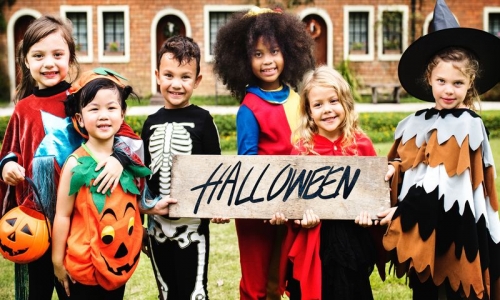I used to think witches, demons, and magic spells were just fantasy, something made up for entertainment . . . but by the time I was in Middle School, I knew otherwise. My dad was a Baptist pastor, and even he did not grasp the reality of demonic oppression until tormented people started coming to him for help. Some of these individuals had even been victims of satanic ritual abuse, the worst kind of evil you can imagine. This certainly was not something he learned about in seminary, but my dad was determined to help these people find freedom . . . so he went searching for understanding. Because there were few pastors who knew how to navigate such situations, my dad became the local expert in deliverance ministry, and this ended up becoming a large part of my dad’s passion and calling. This is why I learned about Halloween at a young age. I learned that it is the highest “holy” night for Wiccans and Satanists, a time for ritual sacrifices and ceremonies, and for the worship and invocation of evil. But we did not just read about these things in a book, we learned about them from people who had lived through the unfathomable atrocities that occur on this day. This insight forever changed my view of Halloween, and I could no longer consider it just a fun day for costumes and candy.
Ephesians 5:11 states, “And have no fellowship with the unfruitful works of darkness, but rather expose them.” By participating in Halloween, I thought I would be guilty of fellowshipping with darkness, so I vowed that when I had children I was not going to have anything to do with Halloween. And even before my son was born, I tried to completely separate myself from the festivities. I remember sitting in my den watching television with my husband one Halloween night when the doorbell rang. I did not buy any candy to pass out so I had turned off the lights outside to signal I was not participating . . . but the television was on so kids could tell someone was home. What was I supposed to do? I panicked, turned off the TV, and told Bob to duck down and hide behind the couch. Yes, I am not kidding, that is really what I did. It felt ridiculous, hiding from trick-or-treaters in my own house, but I had not planned to acknowledge anything related to Halloween so I had no candy to pass out even if I wanted to!
Fast forward a few years, my son Connor is now three. Our neighbors, who were good friends from church, invited us to take our sons trick-or-treating together. My initial inclination was to say “no thank you,” but I had such happy memories of my childhood going trick-or-treating with my sister and then gleefully counting and organizing our candy after we got home. I talked with Bob about it and he also had fond memories of taking his siblings trick-or-treating, so it was something he really wanted to do with Connor. I was torn inside - instead of feeling like I was honoring the Lord by avoiding Halloween, it seemed more like legalism to forbid it. It felt like we were being robbed of the joy of this experience. After all, what is evil about kids dressed in cute costumes going door-to-door asking for candy? I prayed about it, and eventually lost my angst about avoiding Halloween. But did my perspective change simply because I wanted it to? Did I fabricate a peace that aligned with my desires, or did God really give me His blessing to go?
 We took our son trick-or-treating for the next three years. It was fun to mingle with friends and watch Connor’s excitement as he gathered a plastic pumpkin full of sweet treats . . . but to be honest, my spirit was on hyper-alert the whole night. We always chose happy costumes, but I cringed as Connor came face-to-face with other children dressed in frightening costumes. I flashed back to a different childhood memory of mine on Halloween, when a neighbor sent a fake ghost down a line in the trees to scare kids as they approached her doorstep. It terrified me, and I clung to my mom’s leg while tears ran down my face. Over 35 years later I still remember that frightful moment. I began to worry that Connor’s sweet and innocent spirit might also be singed with fear and affected long after the momentary encounters that night. I covered his ears as we walked by the house on the corner, singing a happy song in attempt to drown out the haunting music and screams blaring from their front porch. But this was fun, right?
We took our son trick-or-treating for the next three years. It was fun to mingle with friends and watch Connor’s excitement as he gathered a plastic pumpkin full of sweet treats . . . but to be honest, my spirit was on hyper-alert the whole night. We always chose happy costumes, but I cringed as Connor came face-to-face with other children dressed in frightening costumes. I flashed back to a different childhood memory of mine on Halloween, when a neighbor sent a fake ghost down a line in the trees to scare kids as they approached her doorstep. It terrified me, and I clung to my mom’s leg while tears ran down my face. Over 35 years later I still remember that frightful moment. I began to worry that Connor’s sweet and innocent spirit might also be singed with fear and affected long after the momentary encounters that night. I covered his ears as we walked by the house on the corner, singing a happy song in attempt to drown out the haunting music and screams blaring from their front porch. But this was fun, right?
By the fourth year, I had lost my peace about taking Connor trick-or-treating. I started to pray again about it, because I had already been on both sides of this argument and I really wanted to understand God’s heart on the matter. At some point I had a dream that I went trick-or-treating with a tiny flashlight . . . and after seeking the Lord for understanding, I believed it meant there was a little “light” and fun to be had in the night, but in the big scheme of things, it was negligible. If this was really the case, then I wanted to change my Halloween plan (again). But by this time our family was accustomed to going trick-or-treating together - how in the world would I make a transition away from this without terribly disappointing both Connor and my husband?
To the best of my ability, I longed to walk in God’s perfect will (His best plan), not just His permissive will. Even if it required a hard transition, I wanted to honor the Lord with this decision. So I told God that . . . and then surrendered it at His feet. I broached the subject with Connor, and to my surprise, he said he would rather go to the church’s Fall festival with his friend than go trick-or-treating. And since Connor chose this, my husband was okay with the new plan. (I really need to stop being surprised when God answers my prayers).
So for the next three years, we enjoyed a happy night of Connor dressing up and going “trunk-or-treating” in the church parking lot while fun Christian music blared and kids burned off their sugar on the jump castles. This was not even our home church, but we benefitted from their ministry . . . from this safe and non-scary alternative to Halloween.
So here we are this year, and Connor says he does not want to dress up; he only wants the candy. So this will be our first year transitioning completely out of the tradition. He and I are going to have a date night instead (one that ends at the store where he can pick out his own candy). And no more cowering behind couches in the dark - we now joyfully hand out candy to the kids who come to our door. I have concluded there is nothing dishonoring to the Lord about participating in Halloween in this way; engagement does not necessarily mean endorsement. Rather, it can be an opportunity to bless the children in my neighborhood and share in their happiness.
I later read about a Christian woman who also struggled with what to do about Halloween. She ended up hanging up white Christmas lights in her backyard and inviting her neighbors over for a festival of lights party on Halloween night, thus transforming the day of darkness into a day of light (Romans 13:12). Brilliant. I also read about a couple who took Halloween as an opportunity to model generosity (by handing out the best candy in town), and then seized every opportunity that night to engage people in discussion and point them toward Jesus (you can read the article HERE). So maybe the answer to Halloween is not in the extremes of avoidance or participation, but rather in a creative alternative or compromise – one that celebrates all that is good instead of all that is evil (Philippians 4:8). As believers we are not called to completely separate ourselves from the world in a Christian bubble, but rather called to be separate for God's work in the world . . . while not being conformed to the world (Romans 12:2, John 17:14-16). So is there a way for us to be salt and light in Halloween? It all comes down to whether we believe Christ is against culture, in culture, or over culture. It's a delicate line to walk, but when discussing ways to redeem this night for the Lord, John Piper said, "I'm willing to run the risk of attachment to worldliness in order to be Biblically faithful in our witness."
Knowing the truth about what really happens on Halloween, I still hate it (and my preference would be to get rid of it completely), but the stores are full of Halloween paraphernalia and the neighborhood decorations almost outdo the ones at Christmas-time . . . so there is no way to completely avoid it. Instead of freakishly trying to evade and deny it (like I initially did), what if we seized the opportunity to teach our children about it? What if we used the occasion to help our children grow in discernment, to help them learn which parts of the tradition are okay to participate in, and which parts contradict God’s nature?
For those who are struggling with what to do on Halloween, can I encourage you to seek the Lord for guidance and then just follow your heart? It is certainly possible for us to follow a false peace (one that just resonates with what we want), but God always sees our motives, and He is faithful to honor our pursuit for truth and eventually help us find our way. Jesus came for freedom’s sake (Galatians 5:1) so let’s not put ourselves in bondage over such decisions. As we seek God for wisdom, we can trust Him to guide our path (Jeremiah 29:13, Proverbs 2:1-5).
I realize now that every single day is in God’s hands, even Halloween (Psalm 118:24). I no longer fear the day (or feel like I have to rebuke the enemy every time I see something demonic looking) because I better understand the authority I possess in Christ. Satan is a defeated foe (Colossians 2:15, Hebrews 2:14, 1 John 3:8), and the Spirit who lives in me is way greater than the one in the world (1 John 4:4). Since we empower what we focus on, I spend less time paying attention to what the enemy is doing on Halloween and more time focusing on what God is doing. I refuse to let anyone put out my light, even on Halloween (John 8:12, Matthew 5:14-16).
Christians are probably always going to have different opinions about Halloween - we just need to be careful not to let our convictions cause division in the body of Christ, or to cause others to stumble in their faith (Romans 14:13). In a similar manner, the early believers struggled over whether they had freedom to eat meat that had been sacrificed to idols. Paul admonished them not to quarrel over opinions - not to despise the one who abstains, or pass judgment on the one who chooses to participate. In the end, “each one should be fully convinced in his own mind” (Romans 14:1-5). So whether we decide to participate in Halloween or not, we are to act in accordance with what we have the faith to do (Romans 14:23).
When I had a deep conviction about not participating at all in Halloween, the right thing for me to do was to abstain. God saw the reasons in my heart for wanting to completely separate myself from the tradition so this decision honored Him. But when I prayed about it and then changed my mind, He saw me trying to find His best and follow His lead - He knew I was running from legalism, and from bondage to fear. So for those few years in my life, I had the faith to participate, and I believe God covered and blessed our decision for that season.
As Christians, can we at least agree not to argue with each other about these things? Can we celebrate the freedom we have in Christ and extend grace to one another as we each walk out our unique journeys with the Lord? Though we need to remain unified in the essentials of our faith, we have liberty for the non-essentials . . . and Halloween falls in this category.
So should Christians celebrate Halloween? In the end, that is really between you and God (Romans 14:12).
And whatever you do, whether in word or deed, do it all in the name of the Lord Jesus, giving thanks to God the Father through Him. Colossians 3:17
Further Reading:
"Christians, This Is Our Night"
"When Jesus Haunts Your Halloween"
A Christian guide through Halloween that parents can do with their children: "A Sweet Opportunity: Seeing the Gospel in Halloween - A Family Bible Study"
A BRIEF EXPLANATION REGARDING THE ORIGINS OF HALLOWEEN:
When researching Halloween, I learned that it began hundreds of years ago in England, Ireland, and Northern France as a celebration of the end of Summer and the beginning of Winter, which they recognized as their New Year on November 1st. The Celtic druids honored this day as the biggest holiday of the year, believing that on this day, the souls of the dead could mingle with the living. They called it Samhain, after the lord of death, who they believed sent evils spirits to have their fun with humans on this night (frightening them, harming them, and playing mean tricks on them). According to Celtic tradition, the only way they could try to escape the persecution of the demons was to assume disguises and blend in with them, and offer them fancy foods and sweets.
Samhain remained popular until St. Patrick and other Christian missionaries arrived in the area. However, instead of completely eradicating these pagan practices, the Church made it easier for the local people to convert by offering a Christian alternative, a way to combine Samhain with their All Saint’s Day celebration. All Saints Day stems from the belief that there is a powerful spiritual bond between those who have died and gone to heaven and those who are still alive on earth . . . but instead of communicating with the dead, it was a time for honoring the lives and deaths of the saints. It was an intentional effort to turn Christians away from the dark focus of Samhain, and onto something more Godly.
During the Medieval period, the practice of “souling” emerged among both Catholics and Protestants. They believed prayers could possibly save their dead loved ones, so poor people would visit the houses of the wealthy and receive pastries (called soul cakes) in exchange for a promise to pray for the souls of the their dead relatives in purgatory. Children eventually took up the practice, asking for gifts of food, money, or ale from the homeowners. It was no coincidence that Martin Luther began the Protestant Reformation on October 31st, opposing the idea that penance for sin must be bought by money or earned by works. The reformers even adopted the slogan "Post Tenebras Lux," which means "Afer Darkness, Light." Over time, many of these customs have evolved into our current Halloweens traditions – costumes have replaced evil disguises, and candy has replaced fruit and soul cakes.
Resources:
"What Is Halloween And Should Christians Celebrate It?"






